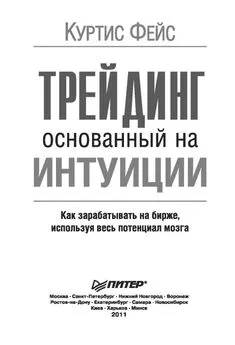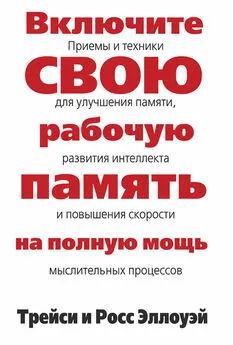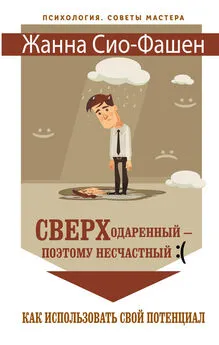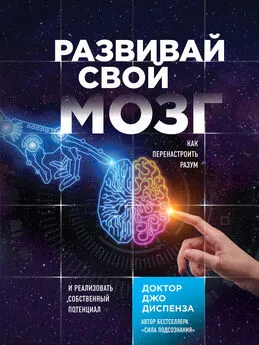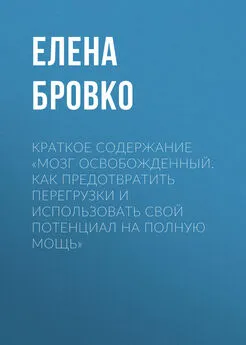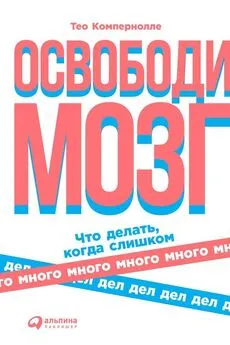Тео Компернолле - Мозг освобожденный. Как предотвратить перегрузки и использовать свой потенциал на полную мощь
- Название:Мозг освобожденный. Как предотвратить перегрузки и использовать свой потенциал на полную мощь
- Автор:
- Жанр:
- Издательство:Array Литагент «Альпина»
- Год:2015
- Город:Москва
- ISBN:978-5-9614-3976-1
- Рейтинг:
- Избранное:Добавить в избранное
-
Отзывы:
-
Ваша оценка:
Тео Компернолле - Мозг освобожденный. Как предотвратить перегрузки и использовать свой потенциал на полную мощь краткое содержание
Мозг освобожденный. Как предотвратить перегрузки и использовать свой потенциал на полную мощь - читать онлайн бесплатно полную версию (весь текст целиком)
Интервал:
Закладка:
108
Honesty requires time (and lack of justifications). Shaul Shalv, Ori Eldar and Yoella Bereby-Meyer. Forthcoming in Psychological Science 2012. http://www.erim.eur.nl/portal/page/portal/ERIM/Content_Area/Documents/Shalvi%20et%20al_Honesty%20requires%20time_PS.pdf
109
http://www.aomonline.org/aom.asp?ID=251&page_ID=224&pr_id=453
110
Predictability Modulates Human Brain Response to Reward. Gregory S. Berns, Samuel M. McClure, Giuseppe Pagnoni, and P. Read Montague. The Journal of Neuroscience, 15 April 2001, 21(8), pp. 2793–2798.
111
Experienced surgeons can do more than one thing at a time: effect of distraction on performance of a simple laparoscopic and cognitive task by experienced and novice surgeons. K. E. Hsu, F.-Y. Man Ӕ R. A. Gizicki, L. S. Feldman Ӕ. G. M. Fried. Surg Endosc (2008) 22; pp. 196–201.
112
Habit and Nonhabit Systems for Unconscious and Conscious Behavior: Implications for Multitasking. John Lisman and Eliezer J. Sternberg. Journal of Cognitive Neuroscience 2013 25:2, pp. 273–283.
113
Talks to Teachers on Psychology: And to Students on Some of Lif’’s Ideals. William James (1899) in: Google Books. http://books.google.nl/books?id=w-GNZHwQxEUC&printsec=frontcover&dq=James,+W.,+1899.+Talksto+Teacherson+Psychology.&hl=en&sa=X&ei=1LY0UdCXGcW90QXAk4DwCg&redir_esc=y#v=onepage&q&f=false
A Critical Review of Habit Learning and the Basal Ganglia. Carol A. Seger and Brian J. Spiering. Front Syst Neurosci. 2011; 5: 66.
114
Cortical andIk informer nog eens her en der. basal ganglia contributions to habit learning and automaticity.Ashby FG, Turner BO, Horvitz JC. Trends Cogn Sci. May, 2010;14(5); pp. 208–215.
Using optogenetics to study habits, Kyle S. Smith, Ann M. Graybiel, Brain Research. Доступно онлайн 10 января 2013, http://www.sciencedirect.com/science/article/pii/S0006899313000516
115
Steve Jobs. The making of Macintosh – An Interview with The Macintosh Design Team (Byte. February, 1984, pp. 60). Копия оригинальной статьи находится здесь: http://blog.modernmechanix.com/2008/06/09/the-making-of-macintosh-an-interview-with-the-macintosh-design-team/
116
Conditions for Intuitive Expertise. A Failure to Disagree. Daniel Kahneman and Gary Klein. American Psychologist, Vol. 64(6), September 2009, pp. 515–526.
117
Conditions for Intuitive Expertise. A Failure to Disagree. Daniel Kahneman and Gary Кlein. American Psychologist, Vol. 64(6), September 2009, pp. 515–526.
118
The effects of stress and desire for control on superstitious behavior. Keinan, G. (2002). Personality and Social Psychology Bulletin, 28, pp. 102–108.
119
Skinner, B.F. (1948). Superstition in the pigeon. Journal of Experimental Psychology, 38, pp. 168–172.
120
Bijgeloof in de sport. Peter De Wannemaeker. 1984. Katholieke Universiteit Leuven.
121
Souza, André L., and Cristine H. Legare. “Priming randomness increases the evaluation of ritual efficacy.”
122
Wright, P., & Erdal, K.J. (2008). Sport superstition as a function of skill level and task difficulty. Journal of Sport Behavior, 31(2), pp. 187–199.
123
Burger, J., & Lynn, A.L. (2005). Superstitious behaviour among American and Japanese professional baseball players. Basic and Applied Social Psychology, 27(1), pp. 71–76.
124
Rudski, J.M., & Edwards, A. (2007). Malinowski goes to college: Factors influencing students’ use of ritual and superstition. The Journal of General Psychology, 134(4), pp. 389–403.
125
Интересное исследование с хорошим обзором: Contemplation and Conversation: Subtle Influences on Moral Decision Making. Brian C. Gunia, Long Wang, Li Huang, Jiunwen Wang and J. Keith Murnighan. ACAD MANAGE J, February 1, 2012 vol. 55 no. 1, pp. 13–33.
126
The Morning Morality Effect. The Influence of Time of Day on Unethical Behavior. Maryam Kouchaki. Isaac H. Smith. Psychological Science, October 28, 2013.
127
Compliant Sinners, Obstinate Saints: How Power and Self-Focus Determine the Effectiveness of Social Influences in Ethical Decision Making. Marko Pitesa. Stefan Thau. Academy of Management Journal. 56, 3 (2013), pp. 635–658. http://hal.archives-ouvertes.fr/docs/00/81/46/14/PDF/pitesa_thau_amj_2013.pdf
Contemplation and Conversation: Subtle Influences on Moral Decision Making. Brian C. Gunia, Long Wang, Li Huang, Jiunwen Wang and J. Keith Murnighan. ACAD MANAGE J, February 1, 2012 vol. 55, no. 1, pp. 13–33.
Больше об этом читайте в моей небольшой брошюре «Навязчивые руководители» (“Pain in the ass managers”), которую можно бесплатно скачать на моем сайте www.compernolle.com.
128
https://docs.google.com/file/d/1r9oVtnEhL82LJZJJKpizLmVCfKiqiP25UuSdQn6bTWI/edit?pli=1или www.compernolle.com – и кликните, чтобы бесплатно скачать текст.
129
Для обозначения такой «заботливой» конфронтации я придумал термин carefrontation – care (забота) и confrontation (конфронтация). Без заботы о чувствах другого человека конфронтация может легко ранить. Однако чрезмерная чуткость может препятствовать здоровой конфронтации и вести к стагнации.
130
Over breinblinddoeken en ezelsbreinbrugjes die ons brengen waar we niet willen zijn. Theo Compernolle. Marketing Jaarboek, pp. 52–61. Pimms NV. 2011.
131
Large-scale brain networks in affective and social neuroscience: towards an integrative functional architecture of the brain, Lisa Feldman Barrett, Ajay Bhaskar Satpute, Current Opinion in Neurobiology, Volume 23, Issue 3, June 2013, pp. 361–372.
The brain basis of emotion: a metaanalytic review. K.A. Lindquist, T.D. Wager, H. Kober, E. Bliss-Moreau, L.F. Barrett. Behav Brain Sci, 35 (2012), pp. 121–143.
A functional architecture of the human brain: emerging insights from the science of emotion. K.A. Lindquist, T.D. Wager, H. Kober, E. Bliss-Moreau, L.F. Barrett. Trends in Cognitive Sciences, November 2012, Vol. 16, No. 11 533.
Comment: The Appraising Brain: Towards a Neuro-Cognitive Model of Appraisal Processes in Emotion. Tobias Brosch, David Sander. Emotion Review, April 2013, vol. 5, no. 2, 163–168.
On the Causal Role of Appraisal in Emotion. Agnes Moors. 2013 5: 132 Emotion Review
Identifying Emotions on the Basis of Neural Activation. Kassam K.S., Markey A.R., Cherkassky V.L., Loewenstein G., Just MA. PL oS ONE 8(6): e66032. (2013).
Clarify Brain Affective Processing Without Necessarily Clarifying Emotions. Peter Walla and Jaak Panksepp. Novel Frontiers of Advanced Neuroimaging, 2013, Chapter 6.
http://cdn.intechopen.com/pdfs/41876/InTech-Neuroimaging_helps_to_clarify_brain_affective_processing_without_necessarily_clarifying_emotions.pdf
On the Causal Role of Appraisal in Emotion. Agnes Moors. Emotion Review, April 2013 vol. 5, no. 2, 132–140 +++.
Appraisal Theories of Emotion: State of the Art and Future Development. Agnes Moors, Phoebe C. Ellsworth, Klaus R. Scherer and Nico H. Frijda. 2013 5: 119.
Emotion Review Neuroscience of affect: brain mechanisms of pleasure and displeasure, Kent C. Berridge, Morten L. Kringelbach, Current Opinion in Neurobiology, Volume 23, Issue 3, June 2013, 294–303.
132
Control of goal-directed and stimulus-driven attention in the brain. Corbetta, M., & Shulman, G. L. (2002). Nature Reviews Neuroscience, 3, 201–215.
Anxiety and Cognitive Performance: Attentional Control Theory, Michael W. Eysenck et al., 7 Emotion 336, 338 (2007).
Anxiety, processing efficiency, and cognitive performance.Derakshan, Nazanin, and Michael W. Eysenck. European Psychologist 14.2 (2009), 168–176.
Anxiety and Performance: The Disparate Roles of Prefrontal Subregions Under Maintained Psychological Stress. Takizawa, Ryu, et al. Cerebral Cortex (2013).
Portrait of the angry decision maker: how appraisal tendencies shape anger’s influence on cognition. Jennifer S. Lerner1, Larissa Z. Tiedens. Journal of Behavioral Decision Making. Special Issue: The Role of Affect in Decision Making. Volume 19, Issue 2, April 2007, 115–137.
133
The Mirror Mechanism as Neurophysiological Basis for Action and Intention Understanding. Leonardo Fogassi, Giacomo Rizzolatti. in: Is Science Compatible with Free Will? Suarez, Antoine; Adams, Peter (Eds.) 2013, 117–134. January 2007.
134
‘Like me’: a foundation for social cognition. Andrew N. Meltzoff. Developmental Science. Volume 10, Issue 1, January 2007, 126–134.
Foundations for a New Science of Learning. Andrew N. Meltzoff, Patricia K. Kuhl, Javier Movellan Terrence J. Sejnowski. Science, 17 July 2009: Vol. 325, no. 5938, 284–288.
Observing complex action sequences: The role of the fronto-parietal mirror neuron system, Istvan Molnar-Szakacs, Jonas Kaplan, Patricia M. Greenfield, Marco Iacoboni, NeuroImage, Volume 33, Issue 3, 15 November 2006, 923–935.
135
Neural Substrates of Social Emotion Regulation: A fMRI Study on Imitation and Expressive Suppression to Dynamic Facial Signals. Pascal Vrticka, Samanta Simioni, Eleonora Fornari, Myriam Schluep, Patrik Vuilleumier, and David Sander. Front Psychol. 2013; 4: 95. http://www.ncbi.nlm.nih.gov/pmc/articles/PM C3582997/
136
Getting a grip on other minds: Mirror neurons, intention understanding, and cognitive еmpathy. Jonas T. Kaplan. Social Neuroscience. Volume 1, Issue 3–4, 2006.
The Mirror Mechanism as Neurophysiological Basis for Action and Intention Understanding. Leonardo Fogassi, Giacomo Rizzolatti in: Is Science Compatible with Free Will? Suarez, Antoine; Adams, Peter (Eds.) 2013, 117–134.
Mirror Neurons, Evolution, and Eco-Empathy. Gary Olson. SpringerBriefs in Political Science Volume 10, 2013, pp. 21–30.
How from action-mirroring to intentionascription? Pierre Jacob. Consciousness and Cognition. http://www.sciencedirect.com/science/article/pii/S1053810013000287
137
Unconscious cerebral initiative and the role of conscious will in voluntary action. Libet, B. (1985). Behavioral and Brain Sciences. 8, 529–539.
On Habit Learning in Neuroscience and Free Will. Javier Bernácer, José Manuel Giménez-Amaya. Chapter 12 in: Is Science Compatible with Free Will? 2013, pp. 177–193.
Does the brain “initiate” freely willed processes? A philosophy of science critique of Libet-type experiments and their interpretation. Hans Radder & Gerben Meynen. Theory Psychology, February 2013 vol. 23, no. 1, pp. 3–21.
138
Много позднее это было все еще принято в некоторых культурах. См. книгу Чарльза Истмена «Мое индейское детство» (М.: Восход, 2013), (“Indian Boyhood” by Charles Eastman).
Читать дальшеИнтервал:
Закладка:

